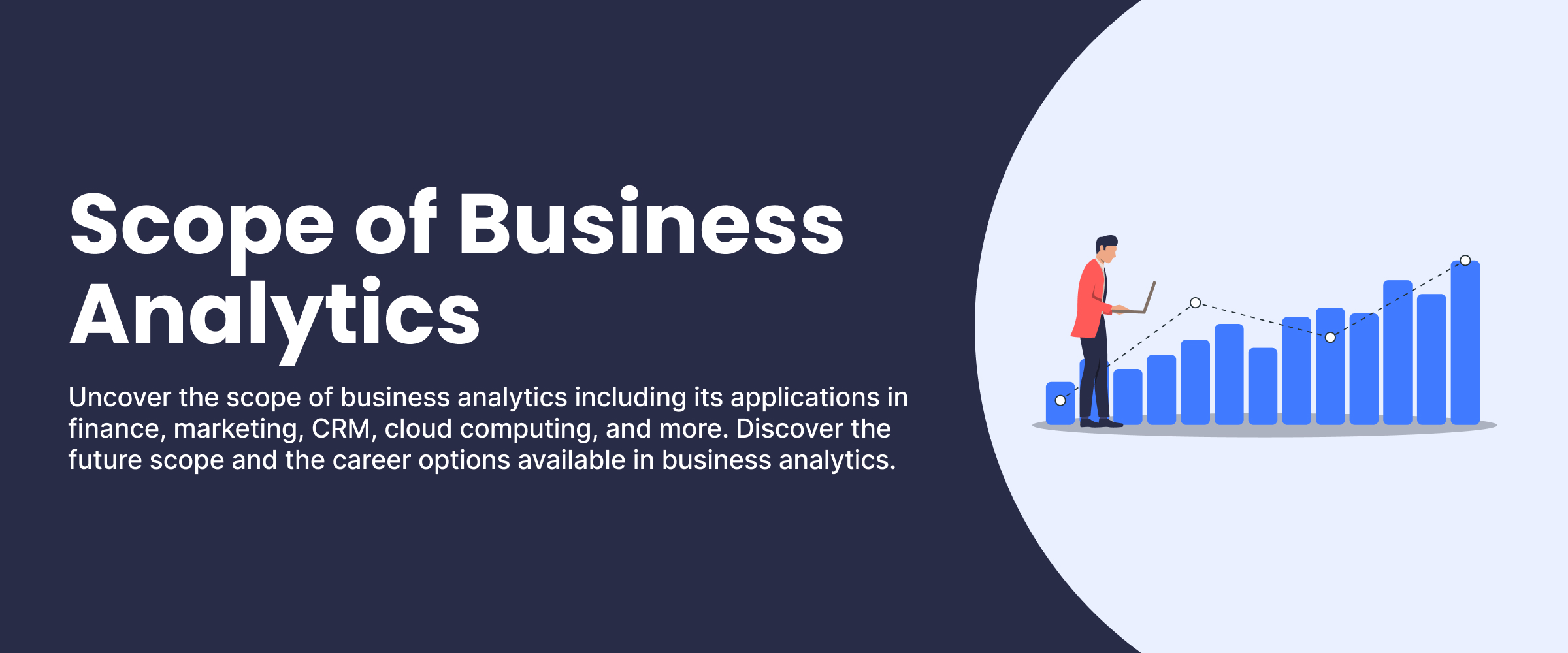Scope of Business Analytics
According to a survey, 65% of enterprises are willing to spend more on analytics to drive measurable growth for their businesses. With the use of business analytical tools, businesses, and organizations can properly study and analyze data to make well-informed decisions. By leveraging data from various sources and applying analytical techniques, businesses can better understand their customer base, optimize their operations, and anticipate market trends.
Business analytics can be applied to a wide range of business processes, from marketing to customer service to finance. It is a lucrative field with plenty of job opportunities available across industries. In this blog, we will explore the scope of business analytics and its potential for businesses.
Understanding Business Analytics
Every business uses data insights to measure the performance of their business. For this purpose, they rely on business analytical tools and technologies to review massive data sets. Through the business analysis process of examining data sets, an analyst can identify patterns, trends, and correlations in the data. The basic process of business analytics includes:
- Identifying the business need
- Collecting and analyzing the data
- Predicting outcomes
- Finding the best solution to make effective business decision
Business analytics not only provides data-based insights but also helps businesses find solutions to their problems. They are used to improve the customer experience and optimize operations. Pursuing a business analyst course with a placement can help you understand the fundamentals of business development and analytics.
Types of Business Analytics
To optimize operations based on business needs, there are four types of business analytics. Businesses use the most suitable type of analytics to understand their business metrics.
- Descriptive Analytics: It seeks to describe the past performance of a business. It involves taking historical data and using it to generate insights about the current state of the business. It can help to understand customer behavior and identify trends and patterns in the data.
- Diagnostic Analytics: It is used to identify the root cause of a problem or issue and develop strategies for improvement. It involves analyzing data to find correlations between different variables and identify areas for improvement.
- Predictive Analytics: This is the process of analyzing data to make predictions about future events or outcomes. It involves using data mining, machine learning, and statistical techniques to uncover patterns in data and develop models that can be used to make predictions.
- Prescriptive Analytics: This is a branch of business analytics that uses data-driven models to examine data and prescribe the best course of action for a particular situation. It combines predictive analytics, data mining, and machine learning to analyze current data and generate predictive models to predict future business decisions.
Also, learn the difference between business analyst and data analyst.
Applications of Business Analytics in Various Fields
The scope of business analytics is broad. Business analytics are used in a variety of fields, including finance, human resources, marketing, machine learning, data mining, and more. Let us explore the potential of business analytics in various fields.
1. Finance
The finance industry relies heavily on business analytics tools and techniques to make informed decisions and improve financial performance. The primary goals of business analytics in finance include:
- Identifying trends in financial markets
- Analyzing investment performance
- Detecting and preventing fraud
- Assessing financial risk
- Gaining insights into customer financial data
With the help of business analytics, finance professionals can improve the customer experience, increase revenue, create predictive models to forecast future results, and optimize strategies for better financial performance.
2. Human Resource Management
There are many ways the HR department makes use of business analytics, they are as follows:
- For analyzing employee data such as performance appraisals
- Gathering information on high-performing employees
- Optimizing workflows, forecasting staffing needs, hiring metrics, and more
The applicant tracking system also makes use of business analytics tools to create recruitment reports and present data to improve hiring metrics.
3. Production and Inventory Management
Manufacturing and production companies benefit from business analytics in the following ways:
- It helps companies track production needs and optimize processes to meet and adapt to market demand.
- It analyzes inventory data and supply chain performance to optimize production planning.
- It also identifies bottlenecks in production processes.
With the right strategic insights, businesses can improve inventory and production efficiency, leading to higher profitability.
4. Customer Relationship Management (CRM)
Customer Relationship Management (CRM) is a process that involves building and nurturing relationships with customers to establish long-term associations. Business data insights play a crucial role in helping organizations:
- Comprehend their customer base, preferences, buying patterns, grievances, and other important factors.
- Track customer satisfaction, measure customer loyalty, and identify customer segments, and potential opportunities for customer retention and growth.
- Optimize marketing campaigns, and improve customer service.
5. Marketing
The scope of business analytics also extends to the marketing field. Business analytics insights can be used:
- To shape marketing strategies, determine the effectiveness of campaigns, and measure the success of marketing efforts.
- Segment insights based on customer preferences to identify potential opportunities for customer acquisition and retention.
- To build profiles of customers to better target them with personalized messages. This can help increase customer engagement and loyalty.


The Future of Business Analytics
As technology advances and the need for big data analytics increases, so does the use of business analytics. The scope of business analytics is shifting to the high-tech analysis needs of enterprises. Let us discuss the prospects of business analytics in tandem with data science, machine learning, and more:
1. Big Data Analytics
Business analytics helps companies make sense of the vast amounts of data (big data) they collect and use it to gain insights that can help them improve their operations. Businesses use big data tools like Apache Hadoop, Spark, Tableau, etc., to derive data-driven insights and solve business problems.
2. Cloud Computing
Businesses can use cloud computing services, including cloud storage such as software-as-a-service (SaaS), to store and process large data sets quickly and securely.
Cloud computing enables businesses to use analytics tools and algorithms to gain insights and make data-driven decisions. The ability to access and analyze data quickly and cost-effectively is revolutionizing the way businesses operate.
3. Artificial Intelligence
Artificial intelligence technologies are put to use to aid and speed up business analytics processes. Machine learning and deep learning are the two most popular AI-based technologies used in business analytics. AI-powered data-driven solutions give businesses an edge in faster operations and error-proof decision-making.
4. Automation
The need for automation has become important to make data-driven decisions faster and more efficiently. Many repetitive processes in business analysis tasks can be automated. Automation can reduce costs in areas such as production, marketing, finance, and operations.
5. Internet of Things (IoT)
The Internet of Things (IoT) is bringing about a data revolution that can be analyzed for improved performance. By leveraging the data from IoT, companies can gain insights into consumer behavior, streamline their operations, or create new products and services tailored to customer needs and wants.
For long-term business success, businesses must make use of these current technologies (machine learning, automation techniques, IoT, AI, and more). Companies must invest in the right individuals with the right business analytics skills to help them take advantage of these technologies.
Business Analytics-Related Careers
The scope of business analytics in India is ever-increasing. Some of the career options you can pursue after successfully acquiring business development and analytics skills are:
| Role | Responsibility |
| Business Analyst | Analyzing data and identifying trends to help inform business decisions. |
| Data Scientist | Extracting insights from data to create predictive models and make informed decisions. |
| Business Intelligence Analyst | Create and develop reports and dashboards to track performance data. |
| Data Analyst | Develop and maintain databases and data systems, and create data visualizations such as graphs, charts, pie charts, etc. |
| Financial Analyst | Analyze financial data and provide insights to inform investment decisions, financial strategies, and other business activities. |
| Big Data Analyst | Study and analyze large and complex sets of data to identify patterns, trends, and correlations to inform business decisions. |
| Market Research Analyst | Gather, analyze, and interpret data from various sources to inform decisions about market trends, customer behavior, and product development. |
Still Confused? Read our blog on Is business analyst a good career? and get a better understanding of this field.
Conclusion
The vast scope of business analytics makes it a powerful tool that businesses should consider to achieve profitability. It has the potential to be an invaluable resource for companies in the modern age. Its data-driven approach helps organizations make informed decisions, optimize operational processes, and increase profitability. By leveraging the power of business analytics, businesses can improve their bottom line and ensure their long-term success.
Since business analytics is a huge part of the business development process, it requires the right skills to perform different roles and responsibilities. To excel in this field, consider taking an online business analytics course.






